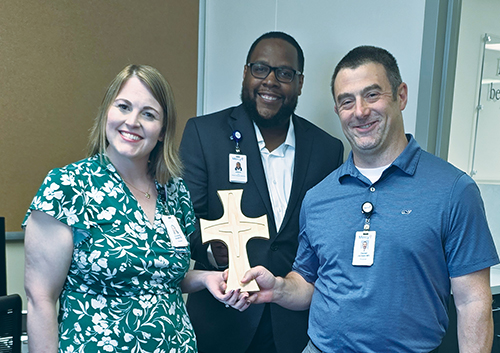
Mercy Hospital St. Louis has opened a clinic with a program to address substance use, mental health and chronic health concerns of pregnant and new moms in a comprehensive way.
The Perinatal Substance Use Clinic offers its Building Recovery, Advocacy, Validation and Empowerment, or BRAVE, program to women with a variety of conditions that are particularly risky for pregnant and new moms. Those conditions include substance use disorders such as dependence on alcohol, tobacco, amphetamines, or cocaine; mental health concerns such as depression, bipolar disorder, schizophrenia and post-traumatic stress disorder; and chronic medical conditions that are particularly dangerous for pregnant and postpartum women, such as high blood pressure, diabetes, and heart or liver problems.
The clinic also can address fetal medical conditions, including fetal growth restriction and congenital anomalies.
Patients can receive a referral from their provider to the clinic, or they can self-refer. The clinic's multidisciplinary staff of 10 helps patients manage substance use disorders and/or coexisting psychiatric conditions and underlying medical conditions. Interventions can include counseling, management of medical care, care integration and collaboration with patients' other care providers. Women are eligible to access the services until one year postpartum, at which time the clinic can connect them back to their obstetrician, primary care physician, or psychiatrist for ongoing care.
The clinic's team includes a perinatal psychiatrist and maternal-fetal medicine physician who are certified in addiction medicine, two nurse practitioners, two counselors, a peer support specialist, two care coordinators and a nurse navigator.
The team's multidisciplinary approach "allows for a seamless and integrated plan of care that allows for the best possible outcomes for the patient and her child," said Dr. Dan Jackson, the maternal-fetal medicine physician who works at the clinic.
"Our care coordinators and therapists allow for our patients to receive full wraparound care, such as trauma therapy, assistance with finding housing and navigating the legal and health care systems, all in a single clinic," he said.
He noted that the team can provide care in-person or remotely. He said this is particularly helpful for women with transportation barriers, those who live in remote areas, and those who cannot miss work to go to the clinic.
The Missouri Department of Health and Senior Services is providing funding for the BRAVE program for three years.
Jackson said Missouri's Pregnancy-Associated Mortality Review committee has found that maternal mental health conditions and substance use disorder are the leading causes of preventable maternal morbidity and mortality. "These deaths and the resulting devastating impact on families are preventable," he said.
Further reading:
